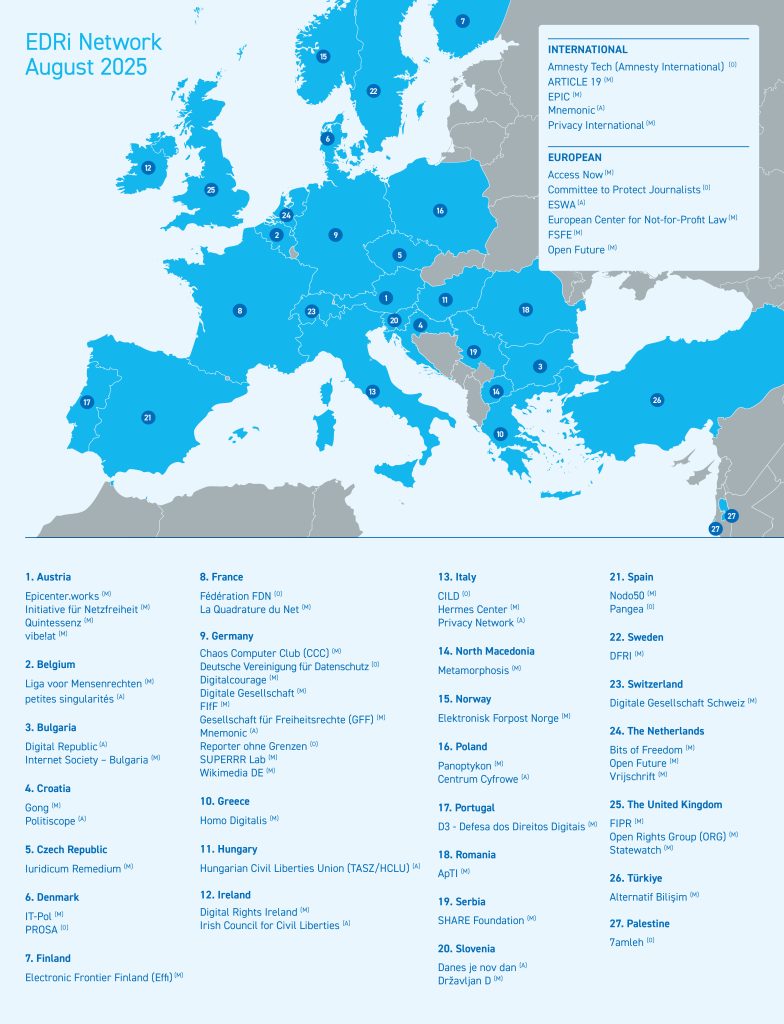Our Network
EDRi is the biggest European network defending rights and freedoms online. The EDRi network is a dynamic and resilient collective of 50+ NGOs, as well as experts, advocates and academics working to defend and advance digital rights across Europe and beyond. Together, we build a movement of organisations and individuals pushing for robust and enforced laws, informing and mobilising people and promoting a healthy and accountable technology market.
Filter by...
Network Organisations
Individual Observers
There are 3 ways of being part of EDRi: Members, Affiliates and Observers.
Members
A non-governmental not-for-profit organisation can become a Member if:
1. It is a legal entity active in a European State, as defined by the geographical scope of the Statute of the Council of Europe, a member state of the European Union (EU), of the European Economic Area (EEA) or of the European Free Trade Association (EFTA), or in a country which is considered by the European Union as a candidate member;
2. It carries out its activities on a continuous basis, independent of any commercial, industrial or political influence or interest. This must have a concrete translation in the organisation’s statutes or bylaws;
3. It demonstrates through its statutes and practice that its goals include the defence and promotion of civil and human rights in the field of information and communication technology;
4. It has a national or European outreach; and it works in one or more areas of digital rights;
5. It has competence in many areas of digital rights; the capacity and representativeness to influence decision making; the ability to provide feedback to EDRi policy and support to EDRi campaigning works; and commits to do so;
6. It is an Affiliate (see below) and it has a history of active engagement in EDRi working groups, discussions, or related activities; and
7. It is recommended by 3 existing EDRi members.
Rights
1. Equal voice in the political positioning of EDRi and capacity to shape the overall strategy;
2. Voting right at the General Assembly of EDRi;
3. Vouch for new Members, Affiliates or Observers;
4. Eligibility to nominate a member for election to the Board;
5. Access to information, updates and EU-policy monitoring services, travel allocations and capacity-building support from the Brussels Office (this can include participation in programs such as Brussels Exchange, exclusive information on funding opportunities, right to represent EDRi in events); and
6. Have 3 representatives in the EDRi mailing list. Upon request of the member, the Board can extend the number of representatives to a maximum of 5.
Responsibilities
1. Attend the General Assembly and/or other important EDRi functions regularly;
2. Pay the annual fees as determined in line with the statutes at that time.
3. Adhere strictly to policies regarding confidentiality and speaking on behalf of EDRi;
4. Contribute to EDRi’s annual report, provide feedback to EDRi policy and support to EDRi campaigning works on a best effort basis. Inform the Brussels office when doing advocacy activities at EU level; and
5. Adhere to policies regarding respectful communication within or on behalf of the EDRi community.
Affiliate
This status is the first step towards becoming a Member. A non-governmental not-for-profit organisation can become a Affiliate if:
1. It is a legal entity active in a European State, as defined by the geographical scope of the Statute of the Council of Europe, a member state of the European Union (EU), of the European Economic Area (EEA) or of the European Free Trade Association (EFTA), or in a country which is considered by the European Union as a candidate member;
2. It carries out its activities on a continuous basis, independent of any commercial, industrial or political influence or interest. This must have a concrete translation in the organisation’s statutes or bylaws;
3. It demonstrates through its statutes and practice that its goals include the defence and promotion of civil and human rights in the field of information and communication technology;
4. It has a national or European outreach; and it works in one or more areas of digital rights, whether it is through advocacy, litigation or campaigning; and
5. It is recommended by 2 existing EDRi members.
Rights
1. Participate in strategic discussions to share their views and perspective;
2. Access to information, updates and EU-policy monitoring services, travel allocations and capacity-building support from the Brussels Office (this can include participation in programs such as Brussels Exchange, exclusive information on funding opportunities, right to represent EDRi in events); and
3. Have 2 representatives in the EDRi mailing list. Upon request of the Affiliate, the Board can extend the number of representatives to a maximum of 3.
Responsibilities
1. Pay the annual fees as determined in line with the statutes at that time.
2. Adhere strictly to policies regarding confidentiality and speaking on behalf of EDRi;
3. Adhere to policies regarding respectful communication within the EDRi community.
4. Provide feedback to EDRi policy and support to EDRi comms or campaigning works on a best effort basis and inform the Brussels office when doing advocacy activities at EU level;
5. Unless there are compelling reasons for this not to be the case, Affiliates will be expected to become full Members a maximum of 2 years after joining EDRi. The GA can decide with simple majority either to change their status to Observer if in light of the gained experience this is the profile better fitting for them; or expel them in the event that:
A. They do not want to become Members, and the GA does not see compelling reasons for them to remain under Affiliate status; or
B. They want to become Members but the GA votes against.
Observers’ organisations and individuals
There are three types of Observers:
1. Individuals (researchers, activists and other stakeholders in the field).
2. Organisations that don’t meet the formal requirements to become a member (university departments, trade unions).
3. Organisations that do meet the formal requirements to become a member, but whose methods or mission differ considerably with EDRi’s (Tor exit node providers, press freedom organisations).
The first type is called Individual Observer and the second two Organisational Observer.
In order to be admissible, Observers need three recommendations from Members and/or Affiliates. The Observership status is permanent and does not expire, but it can be reviewed periodically by the GA.
Rights
1. Be part of the discussions of the political positioning of EDRi;
2. Access to information, updates and policy monitoring services from the Brussels office;
3. Have 1 representative on EDRi’s mailing list.
Responsibilities
1. Pay the annual fees as determined in line with the statutes at that time. The minimum fee is EUR 100 for organisational observers and EUR 10 for individual observers.
2. Adhere strictly to policies regarding confidentiality and speaking on behalf of EDRi; and
3. Adhere to policies regarding respectful communication within the EDRi community.
If you or your organisation are interested in becoming part of EDRi, please get in touch with us by writing to brussels[at]edri[dot]org
EDRi is a member of Trans Atlantic Consumer Dialogue (TACD).
If you or your organisation are interested in becoming part of EDRi, please get in touch with us by writing to brussels[at]edri[dot]org
The process will be the following:
1. An applicant fills in the Application Form and the Information Form as required by EDRi and submits it to the Brussels office. The Brussels office ensures that the application is complete, reviews it and, only when ready, forwards the Application Form and the Information Form to the Board first and then to members. Only complete applications, including required documentation, are taken into consideration.
2. The Brussels office will collect questions from the members and the board and will schedule an interview with the applicant, in order to go through questions, potential conflict of interests, etc. Members located in the same country as the applicant will be informed about the process and can express their opinion. The Brussels office with the help of the Board may look for more information on certain points and may also visit the applicant organisation or ask someone to do so on their behalf .
3. The application and information form, and any additional materials gathered, are presented for review to the board. The Board will inform the Brussels office of their recommendation in writing. The Board can recommend that the applicant becomes a Member/Affiliate/Observer or that the application should be rejected. The Brussels office will forward the recommendation to the Members for discussion and vote at the GA (see below):
- 3.1 For Members: The members will discuss the application for full membership and vote on it at the next General Assembly with simple majority. If the members at the General Assembly voted against the application for membership, the GA can vote on the option to renew the Affiliate Status, decide to change their status to Observer, or expel them.
- 3.2 For Affiliates/Observers: The members will discuss the application for Affiliate status and vote on it via the Members’ mailing list. A simple majority vote with a ”’participation of at least 1/3 of the Members is required”’.



